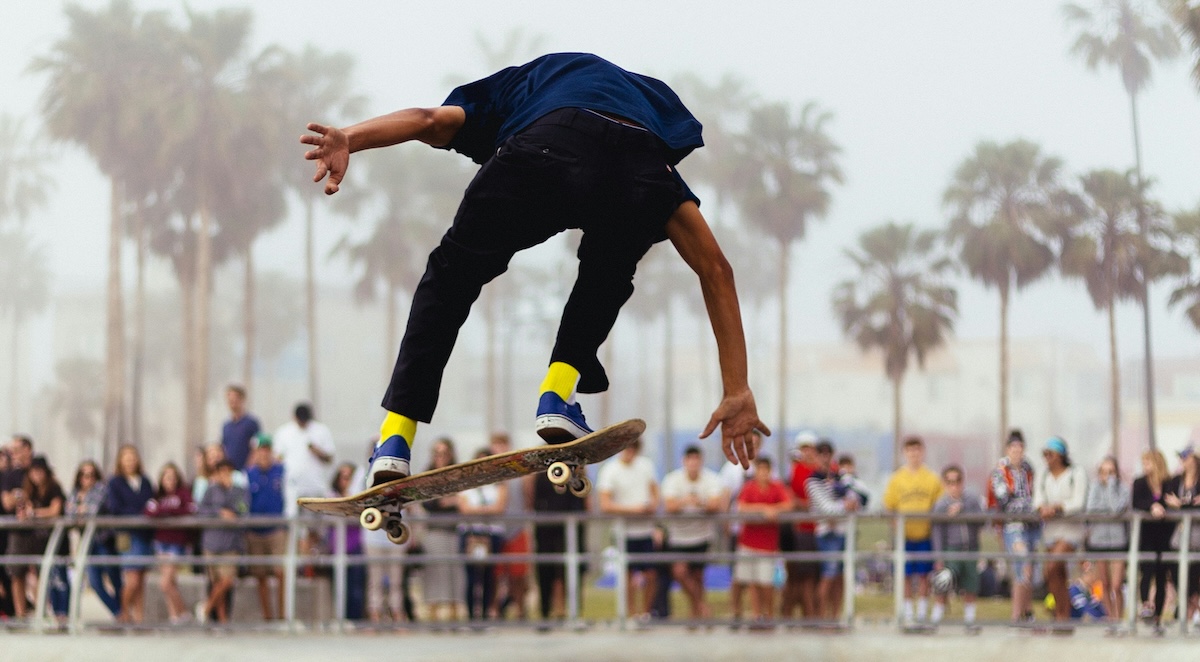Football, basketball, baseball, hockey, soccer, tennis, and golf get the most attention when it comes to player mental health challenges in America. Meanwhile, action sports athletes get pigeonholed as being adrenaline junkies who are supposed to be a little “off their rockers” to do what they do. They pull 1260 turns (three and a half rotations) over hard concrete, ride 30-foot barreling waves on top of jagged reef, and scale over 7500 foot granite monoliths without rope. However, famous skateboarders such as Ryan Scheckler and celebrity snowboarders like Shaun White have recently brought to light the unique challenges that they face. This year (2024) the current World Surf League champion Felipe Toledo walked away in the middle of competition and declared that we was taking the remainder of the season off to tend to his mental health, despite being a near-guarantee to win his third world title.
Expectations of these athletes to compete without regard for their wellness to be successful contributes to their struggles.
“You know, we were bullied. We were expected to perform at the top at the highest level. And no one really understood how to keep your mental health in check. And I feel like a lot of my peers suffered.”
Tony Hawk | Essentially Sports
Does existing on the fringe of sport (despite it being a multi-billion dollar industry in America) neglect consideration for extreme sports and mental health? Are the industry’s athletes more prone to compromised mental and behavioral wellbeing than those from traditional athletics? Let’s review.
How Extreme Sports Athletes Could Be More Vulnerable to Compromised Mental Health Than Traditional Athletes
Sponsorship Pressures at an Earlier Age
One-off scandals regarding early recruiting of high-school athletes aside, money doesn’t get thrown at adolescents in traditional sports until they prepare to leave their post-secondary environment. This is not the case in action sports. It is normal for pre-teens to receive five and six figure endorsement deals from sponsors. Ryan Sheckler, who turned pro at 13 to become youngest gold medalist in X Games history, was first approached by Oakley when he was 7 years old. That may make him a late bloomer by today’s standards as now sponsors are sending gear to 3-year old skaters who show potential. There are no federal or league/organization regulations in place to protect these adolescents from sponsorship recruitment.
America is currently in an uproar about NCAA NIL deals being presented to college basketball and football players. But what about the legion of young action sports athletes? These kids aren’t even old enough to grasp the concept of money management nor the pressures of fulfilling contractural obligations to sponsors on top of expectations to win in physically extreme conditions. Consequently the potential for anxiety, stress, and burnout are high. Given the physical dangers of their sports, any loss of mental focus puts that at great risk of harm.
Elevated Risk Seeking Personality Elevates Risk of Other Issues
“Extreme sports also may attract people with a genetic predisposition for risk, risk-seeking personality traits, or underlying psychiatric disorders in which impulsivity and risk taking are integral to the underlying problem.”
National Library of Medicine
It doesn’t take a body of research (but it exists) to confirm that action sports athletes have elevated risk seeking personalities. While this may serve them well in quelling the fear to compete at an elite level, it does make them vulnerable to certain behavioral health disorders. For instance, elite athletes have a propensity to developing gambling disorder more than the general population, with a risk seeking personality being a cooccurring variable. Risk seeking (and sensation seeking) personality is also connected to substance abuse disorders from adolescence to young adulthood. Studies have also linked risk taking personalities to compulsive sexual behavior.
Extreme Sport Athletes Experience Withdrawal Comparable to Behavioral Addictions
“Extreme sports athletes are often labeled ‘adrenaline junkies’ by the media, implying they are addicted to their sport. Research suggests during abstinence these athletes may experience withdrawal states characteristic of individuals with an addiction.”
Addiction in Extreme Sports: An Exploration of Withdrawal States in Rock Climbers
An interesting study regarding rock climbing athletes found that they appear to experience withdrawal symptoms when abstinent from their sport comparable to individuals with substance and behavioral addictions.
While future research is required to draw definitive conclusions, there are interesting implications to consider. For one, mental health intervention may be required when extreme sports athletes are forced to abstain from participation due to injury, or for when they retire from their respective sport. Furthermore, there is concern that they may seek the same sensations elsewhere when they can’t compete. For instance, participation in extreme sports is known to release high levels of dopamine. Action sports athletes chase the dopamine high, which is often referred to as the “addiction” they feel to their sport. If this is taken away (via injury, etc.) they may get their dopamine via compulsive gambling or problematic porn consumption.
Inadequate Regulations and Support Systems in Place
Major sports associations (NFL, NBA, etc.) and governing bodies in the USA are constantly in the spotlight and cannot skirt responsibilities to athletes when it comes to mental health support. The NFLPA’s Professional Athletes Foundation (PAF) has invested in support systems, as has the NBA, NASCAR, and the other big leagues. There are even state level programs in place to protect the mental health of NCAA collegiate athletes.
What about Street League Skateboarding (SLS), the World Surf League (WSL), or snowboading’s Natural Selection Tour? What about states such as California which boast the greatest number of action sports athletics in the USA? There are inadequate to no regulations nor proper mental health platforms in place to support this unique (and young) sector of professional athletes. They can no longer be left to fend for themselves any longer.
Kindbridge Behavioral Health is one of America’s preeminent providers of mental health support platforms for amateur, collegiate, professional, and retired athletes. To learn more, reach out via the contacts provided below.
Extreme Sports Athletes and Organizations Concerned About Mental Health
CALL +1 (877) 426-4258
OR


